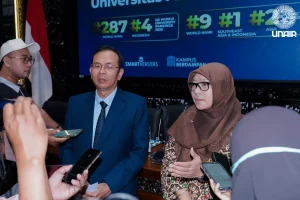UNAIR NEWS – As one of the world’s megabiodiversity nations, Indonesia is home to a vast array of living organisms, including diverse microbial life. Among them, Bacillus species have garnered increasing interest from researchers. These bacteria thrive in various environments such as soil, water, plants, animals, and organic matter.
Highlighting this potential, Prof. Dr. Salamun, Drs., MKes, a professor of Applied Microbiology at Universitas Airlangga’s Faculty of Science and Technology (FST), delivered his inaugural address on Thursday (May 8, 2025) at the Garuda Mukti Hall, UNAIR’s MERR-C campus. In his scientific oration, Prof. Salamun underscored the substantial potential of Bacillus bacteria as an eco-friendly raw material for innovative products.
“Environmentally friendly, multifunctional products made from Bacillus have highly promising prospects across various sectors. Indonesia’s rich tropical ecosystems could serve as a reservoir for novel Bacillus species with distinct, specialized traits. These innovations may offer sustainable alternatives to harmful synthetic chemicals,” he stated.
Unlocking potential of Bacillus
Through his extensive research, Prof. Salamun has identified several promising local Bacillus strains in Indonesia. “One example is Bacillus thuringiensis BK5.2 and Bacillus mojavensis EG6.4, which can produce natural toxins that effectively eliminate mosquito larvae carrying dengue fever,” he explained.

He added that Bacillus also shows immense promise in agriculture and environmental management. “Bacillus subtilis BK7.1, for instance, could be used as a biopesticide—an alternative to chemical pesticides—and as a bioremediator for waste treatment,” he said.
From lab to industry
According to Prof. Salamun, the ultimate goal is to transition these microbe-based innovations into scalable, multifunctional industrial products. Achieving this requires both technical and strategic approaches to integrate microbial potential into commercial production pipelines.
“This process includes identifying top-performing Bacillus strains, optimizing fermentation techniques, isolating and purifying biotechnological compounds, developing final product formulations, and packaging them for public distribution. While the journey is filled with challenges, the opportunities are equally substantial,” he noted.
To address these challenges, he emphasized the importance of collaboration among key stakeholders, including the government, industry players, academia, and the broader community. “Supportive policies and the backing of research institutions are vital for advancing the industrial application of these innovations,” he concluded.
Author: Mohammad Adif Albarado
Editor: Yulia Rohmawati









